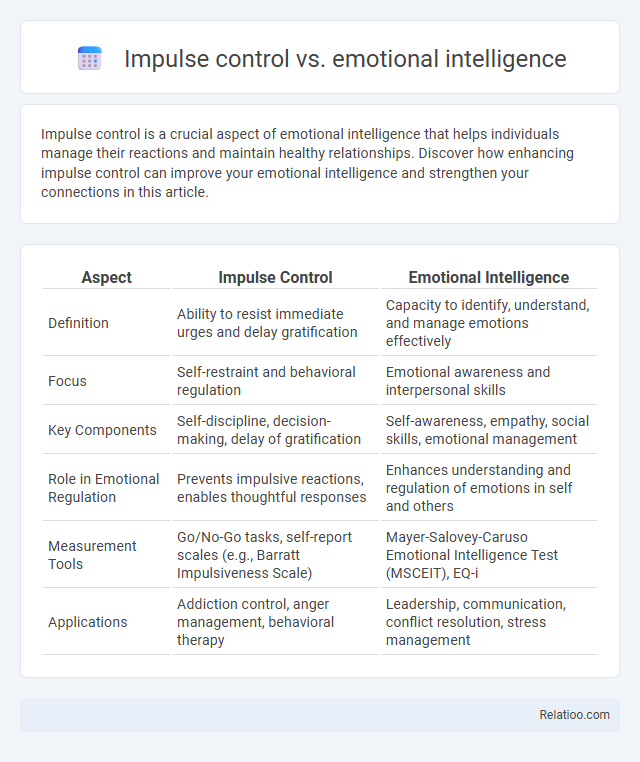Impulse control is a crucial aspect of emotional intelligence that helps individuals manage their reactions and maintain healthy relationships. Discover how enhancing impulse control can improve your emotional intelligence and strengthen your connections in this article.
Table of Comparison
| Aspect | Impulse Control | Emotional Intelligence |
|---|---|---|
| Definition | Ability to resist immediate urges and delay gratification | Capacity to identify, understand, and manage emotions effectively |
| Focus | Self-restraint and behavioral regulation | Emotional awareness and interpersonal skills |
| Key Components | Self-discipline, decision-making, delay of gratification | Self-awareness, empathy, social skills, emotional management |
| Role in Emotional Regulation | Prevents impulsive reactions, enables thoughtful responses | Enhances understanding and regulation of emotions in self and others |
| Measurement Tools | Go/No-Go tasks, self-report scales (e.g., Barratt Impulsiveness Scale) | Mayer-Salovey-Caruso Emotional Intelligence Test (MSCEIT), EQ-i |
| Applications | Addiction control, anger management, behavioral therapy | Leadership, communication, conflict resolution, stress management |
Understanding Impulse Control: Definition and Importance
Impulse control, a critical facet of emotional intelligence, refers to the ability to resist immediate temptations and delay gratification for long-term goals. Understanding impulse control is essential for regulating emotions, decision-making, and behavior in challenging situations, leading to improved relationships and mental health. High impulse control enhances emotional intelligence by enabling individuals to manage reactions and respond thoughtfully rather than impulsively.
Emotional Intelligence: Key Components Explained
Emotional Intelligence encompasses self-awareness, self-regulation, empathy, social skills, and motivation, enabling You to manage emotions effectively and understand others' feelings. While impulse control refers specifically to resisting immediate urges and Emotional Intelligence includes this skill, it expands beyond by fostering interpersonal understanding and emotional management. Developing Emotional Intelligence improves decision-making, relationship quality, and stress management by integrating cognitive and emotional processes.
The Relationship Between Impulse Control and Emotional Intelligence
Impulse control, a critical component of self-regulation, directly influences emotional intelligence by enabling individuals to manage their reactions and make thoughtful decisions. Emotional intelligence encompasses the ability to recognize, understand, and manage emotions, which improves as impulse control strengthens. High impulse control reduces impulsive behaviors, enhancing emotional awareness and interpersonal relationships through better emotional regulation.
Differences in Brain Function: Impulse vs. Emotion Regulation
Impulse control primarily involves the prefrontal cortex, which governs decision-making and inhibits immediate reactions, while emotional intelligence relies on the interplay between the prefrontal cortex and the amygdala, responsible for processing emotions. Impulse control suppresses automatic responses, focusing on self-regulation and delayed gratification, whereas emotion regulation modulates emotional responses to enhance social interactions and empathy. The neurological differentiation highlights how impulse control is more about restraint, while emotional intelligence integrates emotional awareness with cognitive processing for adaptive behavior.
Real-Life Examples: Impulse Control in Action
Impulse control is crucial in real-life scenarios such as resisting the urge to react angrily during a heated conversation, demonstrating emotional intelligence by managing your emotions effectively. Emotional intelligence enables you to recognize and regulate your impulses, leading to better decision-making and healthier relationships. Real-life examples include delaying gratification in financial decisions or staying calm under pressure, showcasing how impulse control directly impacts your emotional and social well-being.
Emotional Intelligence in Daily Decision-Making
Emotional intelligence enhances daily decision-making by allowing individuals to recognize, understand, and manage their emotions effectively, leading to more thoughtful and measured responses. Impulse control, while crucial, primarily helps in restraining immediate reactions, but emotional intelligence integrates empathy, self-awareness, and social skills to navigate complex situations. This combination empowers better judgment, improved relationships, and successful problem-solving in everyday life.
Developing Impulse Control Skills for Better Outcomes
Developing impulse control skills enhances emotional intelligence by fostering self-regulation and improved decision-making, leading to better personal and professional outcomes. Research shows that individuals with strong impulse control exhibit lower stress levels and higher resilience, which positively impacts relationships and goal achievement. Training techniques such as mindfulness, cognitive reframing, and delayed gratification exercises effectively strengthen impulse control for long-term success.
Enhancing Emotional Intelligence Through Practice
Enhancing emotional intelligence through practice involves developing self-awareness, self-regulation, empathy, and social skills, which are crucial for managing impulses effectively. While impulse control focuses on resisting immediate temptations, emotional intelligence integrates understanding and managing emotions to improve decision-making and interpersonal relationships. Consistent practice in recognizing emotional triggers and employing mindfulness techniques strengthens both emotional intelligence and impulse control for better overall emotional management.
The Impact of Impulse Control on Relationships and Success
Impulse control significantly influences relationship quality and professional success by enabling individuals to regulate reactions and make thoughtful decisions under pressure. High impulse control reduces conflicts and fosters trust in interpersonal interactions while promoting consistent goal-directed behavior critical for career advancement. Emotional intelligence complements impulse control by enhancing awareness and management of emotions, yet impulse control itself remains a foundational skill for maintaining stability and achieving long-term success.
Strategies to Balance Impulse Control and Emotional Intelligence
Balancing impulse control and emotional intelligence involves developing self-awareness to recognize emotional triggers and practicing mindfulness techniques to pause before reacting impulsively. Implementing cognitive-behavioral strategies helps regulate immediate urges while enhancing empathy and social skills strengthens emotional understanding. Consistent practice of delayed gratification and active emotional reflection promotes harmony between managed impulses and intelligent emotional responses.

Infographic: Impulse control vs Emotional intelligence
 relatioo.com
relatioo.com